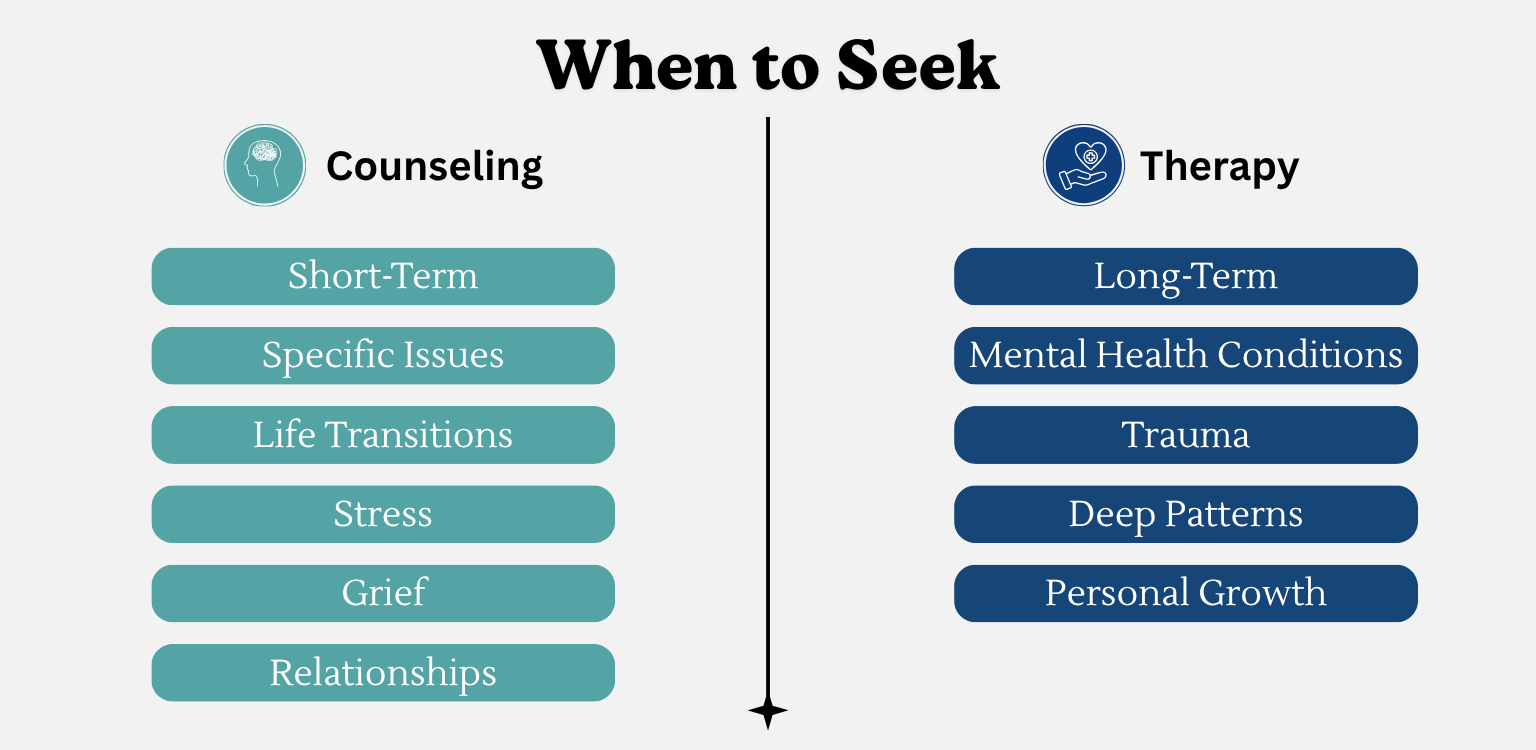Counseling vs. Therapy: Key Differences You Should Know
When people search for mental health support, one of the most common questions is: “Is therapy the same as counseling?” While the two terms are often used interchangeably, there are important distinctions.
Both counseling and therapy provide safe spaces to discuss personal challenges, process emotions, and develop healthier coping strategies. However, their approaches, timeframes, and objectives often differ. Understanding these differences can help you make an informed decision about the kind of support that fits your unique needs.
Counseling vs Therapy: An Overview
At first glance, counseling and therapy may look very similar. Both involve working with a trained professional to improve emotional well-being, explore challenges, and create healthier coping strategies.
However, counseling vs therapy differs in scope, duration, and focus. Counseling usually targets specific situations and aims to help you move forward quickly, while therapy tends to look deeper into the root causes of emotional or psychological patterns.
Think of counseling as learning tools to handle current struggles, while therapy is more like a journey of self-discovery and healing.
What Is Counseling?
Counseling is often short-term and focuses on specific concerns or life situations. It’s goal-oriented and typically provides you with practical tools and strategies to manage immediate challenges.
For example, you might seek counseling for:
Career stress or workplace conflicts
Relationship challenges or communication issues
Grief or loss after a loved one passes away
Adjusting to life transitions such as moving, divorce, or starting college
Counselors typically work with clients for a set number of sessions, offering structured guidance and problem-solving techniques. They may also teach coping skills, stress management tools, and ways to build resilience.
In short, counseling is often about navigating the present and near future effectively.
What Is Therapy?
Therapy sometimes called psychotherapy is often longer-term and focuses on exploring deeper emotional and psychological patterns. Unlike counseling, which may target one or two main issues, therapy often takes a more holistic approach, examining your past experiences, beliefs, and recurring behaviors.
Therapy may help you work through:
Anxiety or depression that affects daily functioning
Trauma and unresolved past experiences
Relationship patterns that repeat over time
Personal growth, identity concerns, or low self-esteem
Therapists are trained in a variety of approaches, including:
Cognitive Behavioral Therapy (CBT): Helps change negative thought patterns
Psychodynamic Therapy: Explores unconscious patterns and early life experiences
Emotionally Focused Therapy (EFT): Improves emotional connection and bonding in relationships
Because therapy dives deeper, it can often lead to transformational, long-term change rather than immediate solutions.
Therapy or Counseling: Which One Do You Need?
Choosing between therapy and counseling depends on your goals and the nature of your struggles.
If you’re facing a short-term challenge and need tools to cope, counseling may be the right fit.
If you’re looking to explore deeper issues, long-term patterns, or mental health conditions, then therapy may be more appropriate.
It’s also possible to benefit from both at different times in your life. For example, you might start with counseling to deal with immediate stress and later move into therapy to address underlying emotional wounds.
What’s the Difference Between Counseling and Therapy in Practice?
While counseling is generally solution-focused and shorter in duration, therapy dives into underlying causes to create lasting change.
That said, the lines often overlap. For instance:
Many therapists provide counseling for immediate concerns.
Many counselors integrate therapeutic techniques into their practice.
The key difference lies in depth and duration. Counseling helps you move forward quickly, while therapy helps you understand yourself at a deeper level, promoting long-term emotional health.
Final Thoughts
So, what’s the difference between counseling and therapy?
Counseling helps you address specific, short-term challenges.
Therapy explores deeper emotional issues for long-term healing.
Both are valuable, and both can significantly improve your mental wellness.
If you’re unsure which path to take, remember: you don’t have to decide alone. A mental health professional can help assess your needs and guide you toward the right support. Taking the first step is a powerful move toward self-care and healing.




